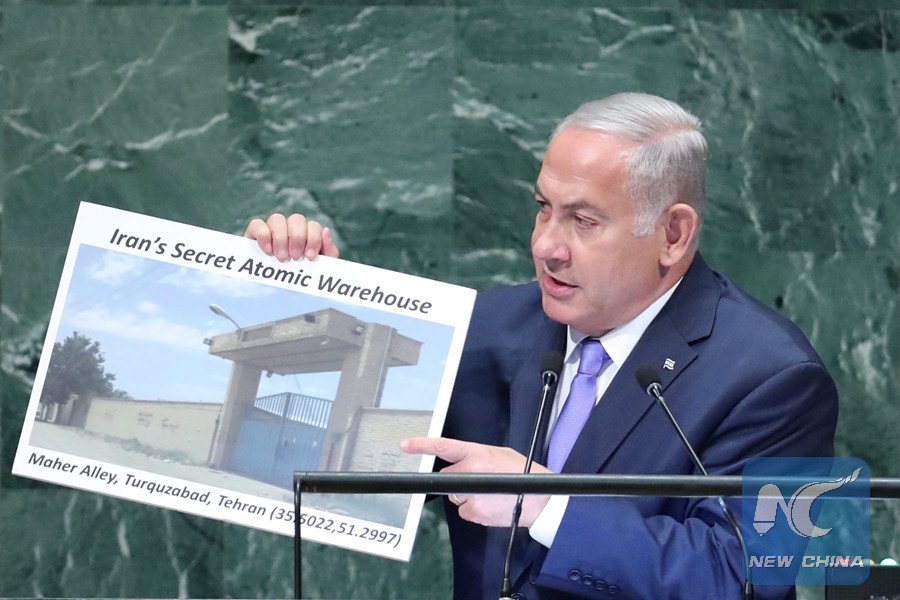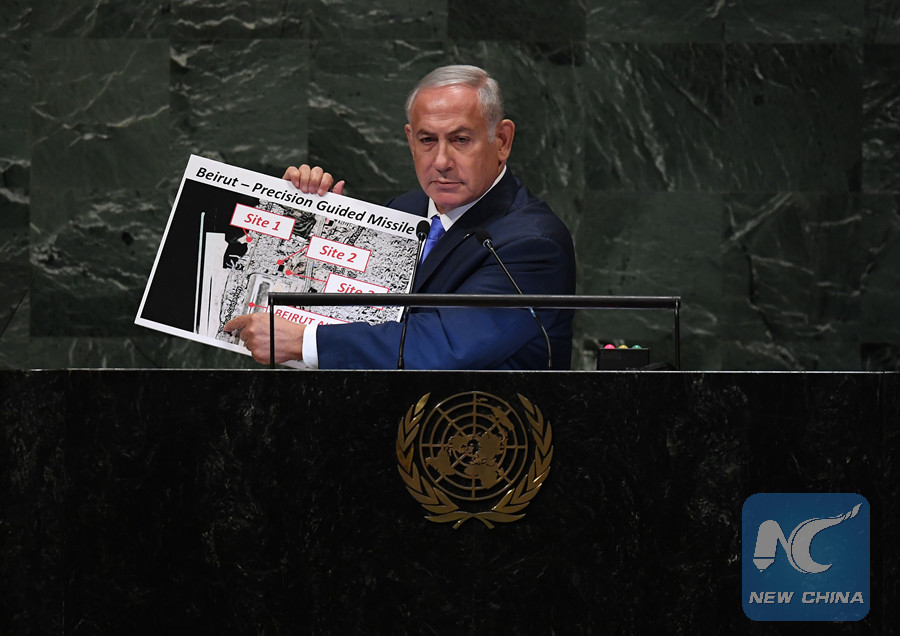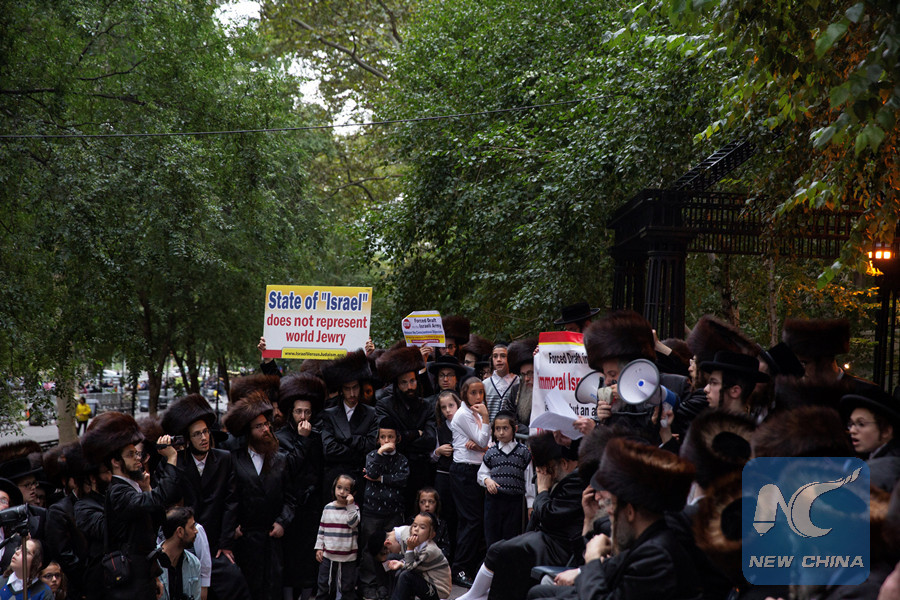
Israeli Prime Minister Benjamin Netanyahu shows a photo marking "Iran's Secret Atomic Warehouse" during his speech at the UN General Assembly on Sept. 27, 2018. (Reuters photo)
JERUSALEM, Sept. 28 (Xinhua) -- In his 10th address to the United Nations General Assembly on Thursday, Israeli Prime Minister Benjamin Netanyahu sounded as determined as ever to expose what he believes is the largest threat to his country's security: the Iranian nuclear program.
Not mentioning the pressing issue of the Israeli-Palestinian conflict, Netanyahu focused, once again, on Israel's arch-enemy, while exposing what he claims to be "a secret warehouse" in Tehran where the Iranian government continues it's nuclear program.
As he held satellite images of the alleged site, he criticized the International Atomic Energy Agency (IAEA) for not taking action since he exposed a supposed nuclear archive seized by Israeli covert forces five months ago.
"Months have passed. The IAEA has still not taken any action. It has not posed a single question to Iran. It has not demanded to inspect a single new site discovered in that secret archive," Netanyahu said at the UN conference.
According to the Israeli prime minister, Iranian officials have been busy transporting nuclear material throughout the country in an attempt to hide it. The Iranians, he said, were using a rug-cleaning plant as a cover for a nuclear warehouse.
Iran immediately dismissed the claims.
Backed by the United States which withdrew from the Iranian nuclear deal in May this year, Netanyahu appeared emboldened.
"Israel is deeply grateful to President Trump for his decision to withdraw from the disastrous nuclear deal with Iran," he said.
"The goal ... was to garner support for Israel's policy vis-a-vis Iran," said Emeritus Uri Bar-Joseph, a professor of Haifa University, questioning whether Netanyahu will be successful.
"Iran will be nuclear," Bar-Joseph told Xinhua. "Even if it won't, it creates through Hezbollah and its missile arsenal probably the biggest threat to Israel since 1948, and the question is whether the strategy Netanyahu and his government are taking is the right one."

Israeli Prime Minister Benjamin Netanyahu shows a photo marking "Beirut-Precision Guided Missile" during his speech at the UN General Assembly on Sept. 27, 2018. (Reuters photo)
Hezbollah, an Iranian proxy militant organization, has been in a decades-long conflict with Israel. The last war between the two in 2006 saw Hezbollah-controlled territories in southern Lebanon all but obliterated by Israeli fire power.
A renewed conflict between the sides is believed to be only a matter of time and will likely be much deadlier than the last because of Iran's alleged funneling of precision missiles to Hezbollah.
Netanyahu held up a map of what he claimed as Iranian missiles caches in Lebanon. Perhaps it was a move to legitimize hundreds of airstrikes Israel has been reportedly conducting in both Syria and Lebanon in attempt to curb Iran's expansion.
But it is doubtful that Israel will attack Iran. As long as the nuclear agreement is in place with large international support, Netanyahu will not be able to justify a pre-emptive strike. Also, the U.S. support for such an adventure seems highly unlikely.
For years, Netanyahu seems to put insufficient focus on the issue very close to home. The conflict with the Palestinians has the potential of boiling over and becoming a major headache at any moment.

Jewish Americans hold a protest against the State of Israel outside of UN headquarters as Israeli Prime Minister Benjamin Netanyahu attends the General Assembly of the United Nations in New York, on Sept. 27, 2018. (Reuters photo)
"Lack of advancing to a solution of the conflict with the Palestinians is an incubator for more problems for Israel," said Bar-Joseph.
The Israeli leader briefly said he was looking forward to making peace with the Palestinians, amongst other Arab countries. He then proceeded to criticize Palestinian President Mahmoud Abbas for his policies.
"Year after year, his UN speeches are all about the Iranian issue. This will eventually lose the attention of the international community and even in Israel," said Nimrod Goren, head of Mitvim, the Israeli Institute for Regional Foreign Policies.
"It reduces Israel's foreign policy to a single issue while there are a lot of other issues that are important to raise and engage the international community in," Goren stressed.
While Netanyahu and U.S. President Donald Trump still find themselves largely isolated on issue of the Iranian nuclear program, the Israeli prime minister has managed to sideline the Palestinian matter and push it back in the international agenda.
"He is successful in having the international community less and less engaged in the Palestinian issue," Goren told Xinhua.
Netanyahu may have left the podium convinced that his revelations will shock the world into the action he seeks: more sanctions on Iran. But more likely, the speech will be archived like his previous ones and he will be left alone, accompanied only by the United States.

